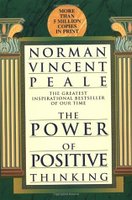
Norman Vincent Peale’s 1952 best-seller
During this strange election cycle it has not escaped notice that a major influence on Donald Trump, whose connection to Christianity seems minimal, was Norman Vincent Peale, one of the twentieth century’s best known preachers and best-selling authors. What has not been recognized is the extent to which Peale’s influence explains Trump’s popular appeal.
Trump grew up going to Manhattan’s Marble Collegiate Church, the Dutch Reformed (RCA) congregation dating to the 17th century that Peale served as senior minister from 1932 to 1984. Trump married his first wife Ivana there in 1977, with Peale officiating. Asked by Republican political operator Frank Luntz at the Iowa Family Leadership Summit last July whether he’d ever asked God for forgiveness, Trump pivoted in that direction:
The great Norman Vincent Peale was my pastor…He would give a sermon. You never wanted to leave…It was unbelievable. I still remember his sermons. What he would do is he would bring real-life situations, modern-day situations, into the sermon. And you could listen to him all day long. When you left the church, you were disappointed it was over. He was the greatest guy.
“But,” persisted Luntz, “have you ever asked God for forgiveness?” Audience laughter. Pause. “I’m not sure I have,” Trump, slightly flummoxed, replied. “I just try and do a better job from there.”
In fact, asking God for forgiveness was not what Peale preached. His gospel was all about accessing spiritual power to get the job done. The title of his second book, published in 1938, is You Can Win. Sound familiar?
As the historian Donald Meyer shows in his fine study, The Positive Thinkers, Peale was the latest in a line of popular American spiritual leaders stretching back into the 19th century who promoted Mind Cure — a philosophy that teaches that obstacles to a good life are fundamentally psychological and can (only) be cured by positive attitudes and beliefs.
Peale’s hugely best-selling The Power of Positive Thinking (1952) — “a great book,” Trump told the Iowans last summer — puts it this way:
What we do with obstacles is directly determined by our mental attitude. Most of our obstacles, as a matter of fact, are mental in character.
“Ah,” you may object, “mine are not mental, mine are real.”
Perhaps so, but your attitude toward them is mental.
“The mind can overcome any obstacle,” Trump told the New York Times‘ Marilyn Bender in 1983. “I never think of the negative.”
Where Mind Cure doyenne Mary Baker Eddy, the founder of Christian Science, was fixated on mental triumph over physical ailments, Peale’s focus was success in worldly pursuits. “There was a time when I acquiesced in the silly idea that there is no relationship between faith and prosperity; that when one talked about religion he should never relate it to achievement, that it dealt only with ethics and morals or social values,” he declares in The Power of Positive Thinking. “But now I realize that such a viewpoint limits the power of God and the development of the individual.”
Politically conservative, Peale was a regular speaker at businessmen’s booster clubs and toastmaster at Horatio Alger awards dinners. “The Apprentice” can be seen as Reality TV’s answer to Alger’s novels: reiterated tales of how a determined, hardworking lad rises to the top by impressing the boss with his hard work and determination. The Art of the Deal is a secularized version of The Power of Positive Thinking.
It’s no surprise that, among religious leaders, Trump should be getting his most enthusiastic hearing from promoters of the Prosperity Gospel. But we shouldn’t think of Trumpism in their terms — a straight-up return on an investment of faith (plus material contributions). What Trump the presidential candidate has done is turn America as a whole into one of those psychologically hobbled souls in need of Mind Cure.
For Trump is not so much a congenital liar as a person for whom unpleasant truths exist only as obstacles to be thought away. Never mind what the Mexicans say, of course they’ll pay for the wall. Never mind that U.S. manufacturing and coal-mining jobs are gone with the global wind, of course they’ll be brought back. Never mind that California has had less rainfall in the past five years than ever in recorded history, there is no drought.
What Trump voters are buying is the latest version of a product fashioned deep in their collective unconscious. According to his de-spiritualized version of Mind Cure, the power will come not from The Almighty but from The Donald, a boss so capable of curing a mentally impaired America that we’ll get tired of winning. It’s a beautiful thing, and a wonder to behold.





